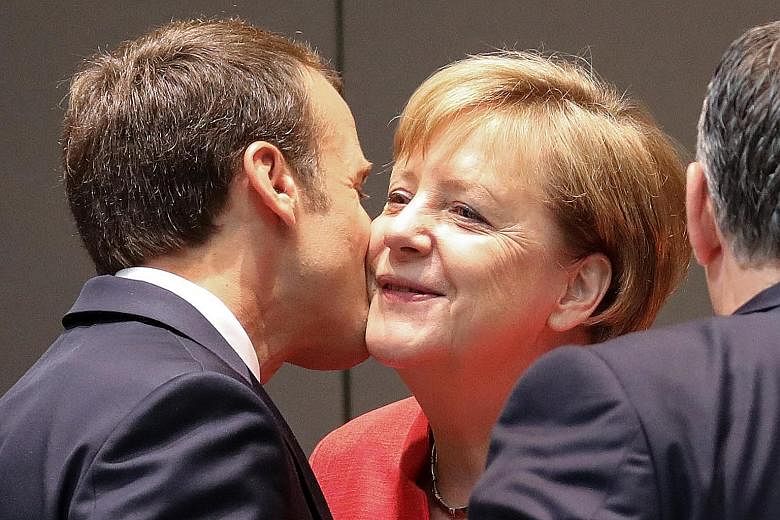BRUSSELS • European Union leaders have defended a hard-won migration deal agreed after marathon talks yesterday that Italy hailed as a breakthrough despite emerging doubts on whether bloc partners would shoulder more responsibility for migrants.
Italian Prime Minister Giuseppe Conte, who heads a month-old anti-immigration government, had vetoed joint conclusions for the entire agenda of the summit in Brussels until his demands were finally met before dawn.
Italy has turned away a series of migrant boats in recent weeks, sparking a fresh political row three years after the bloc faced its biggest ever migration crisis.
"Today Italy is no longer alone. We are satisfied," Mr Conte, a former law professor who until recently was a virtual political unknown, said following nine hours of talks described as "virulent".
The 28 leaders agreed to consider setting up "disembarkation platforms" outside the bloc, most likely in north Africa, in a bid to discourage migrants boarding EU-bound smuggler boats.
Member countries could also set up migrant processing centres - but only on a voluntary basis - to determine whether the arrivals returned home as economic migrants or were admitted as refugees in willing states.
But French President Emmanuel Macron said these new-style centres would be reserved for countries on key migrant routes such as Malta, Italy, Spain or Greece - and not France.
"France is not a country of first arrival. Some want to push us to that and I refused it," he said as he arrived for a second day of leader talks in Brussels.
Asked if Austria would open a centre, Prime Minister Sebastian Kurz said: "Of course not... we are not a first arrival country, unless people jump from parachutes."
In their deal the leaders also made an offer to German Chancellor Angela Merkel, who faces a rebellion from within her own coalition government, with moves to stop migrants registered in Italy and other EU countries from moving to Germany.
After allowing more than one million asylum seekers into Germany since 2015, Dr Merkel faces an end-of-month deadline from her own interior minister to curb so-called secondary migration.
The summit conclusions called on member countries to take "all necessary" steps to stop migrants initially arriving in countries such as Italy and Greece from moving on to Germany.
Dr Merkel welcomed the move, but acknowledged the hard work needed with some hard choices left for later. "I am optimistic after today that we can now really continue to work, although we have a lot to do, even bridging the different views," she said.
Fewer than 45,000 migrants have made it to the EU this year, according to data from the United Nations, a sharp drop from 2015 when many thousands were entering on a daily basis.
In Brussels, the EU leaders also pledged to react firmly against protectionism and called for a new EU law to screen foreign investments, with Washington and Beijing clearly in mind.
The leaders said the import tariffs imposed by the United States on EU steel and aluminium could not be justified, and supported the European Commission's legal challenge and the duties set on US products.
The conclusions backed by the bloc leaders said Europe would continue to negotiate ambitious free trade agreements with partners - after provisional deals struck in the past 12 months with Japan and Mexico.
The bloc is still seeking a trade deal with the Mercosur group of Argentina, Brazil, Paraguay and Uruguay, and will start talks in July with Australia and New Zealand.
However, there were also lines showing the EU wants to protect its own industries and retain technologies in the face of what it sees as unfair competition.
AGENCE FRANCE-PRESSE, REUTERS

